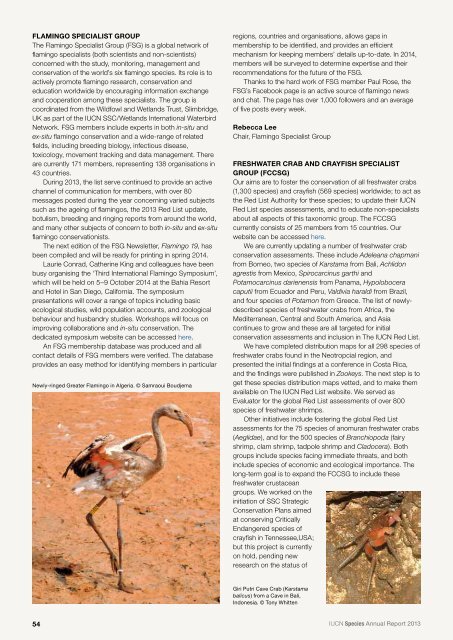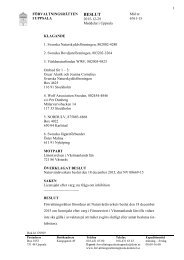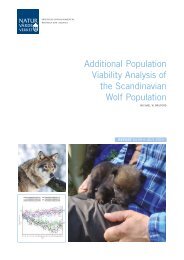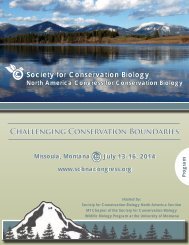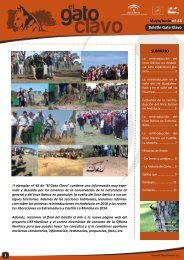1oC3Dbk
1oC3Dbk
1oC3Dbk
You also want an ePaper? Increase the reach of your titles
YUMPU automatically turns print PDFs into web optimized ePapers that Google loves.
Flamingo Specialist Group<br />
The Flamingo Specialist Group (FSG) is a global network of<br />
flamingo specialists (both scientists and non-scientists)<br />
concerned with the study, monitoring, management and<br />
conservation of the world’s six flamingo species. Its role is to<br />
actively promote flamingo research, conservation and<br />
education worldwide by encouraging information exchange<br />
and cooperation among these specialists. The group is<br />
coordinated from the Wildfowl and Wetlands Trust, Slimbridge,<br />
UK as part of the IUCN SSC/Wetlands International Waterbird<br />
Network. FSG members include experts in both in-situ and<br />
ex-situ flamingo conservation and a wide-range of related<br />
fields, including breeding biology, infectious disease,<br />
toxicology, movement tracking and data management. There<br />
are currently 171 members, representing 138 organisations in<br />
43 countries.<br />
During 2013, the list serve continued to provide an active<br />
channel of communication for members, with over 80<br />
messages posted during the year concerning varied subjects<br />
such as the ageing of flamingos, the 2013 Red List update,<br />
botulism, breeding and ringing reports from around the world,<br />
and many other subjects of concern to both in-situ and ex-situ<br />
flamingo conservationists.<br />
The next edition of the FSG Newsletter, Flamingo 19, has<br />
been compiled and will be ready for printing in spring 2014.<br />
Laurie Conrad, Catherine King and colleagues have been<br />
busy organising the ‘Third International Flamingo Symposium’,<br />
which will be held on 5–9 October 2014 at the Bahia Resort<br />
and Hotel in San Diego, California. The symposium<br />
presentations will cover a range of topics including basic<br />
ecological studies, wild population accounts, and zoological<br />
behaviour and husbandry studies. Workshops will focus on<br />
improving collaborations and in-situ conservation. The<br />
dedicated symposium website can be accessed here.<br />
An FSG membership database was produced and all<br />
contact details of FSG members were verified. The database<br />
provides an easy method for identifying members in particular<br />
Newly-ringed Greater Flamingo in Algeria. © Samraoui Boudjema<br />
regions, countries and organisations, allows gaps in<br />
membership to be identified, and provides an efficient<br />
mechanism for keeping members’ details up-to-date. In 2014,<br />
members will be surveyed to determine expertise and their<br />
recommendations for the future of the FSG.<br />
Thanks to the hard work of FSG member Paul Rose, the<br />
FSG’s Facebook page is an active source of flamingo news<br />
and chat. The page has over 1,000 followers and an average<br />
of five posts every week.<br />
Rebecca Lee<br />
Chair, Flamingo Specialist Group<br />
Freshwater Crab and Crayfish Specialist<br />
Group (FCCSG)<br />
Our aims are to foster the conservation of all freshwater crabs<br />
(1,300 species) and crayfish (569 species) worldwide; to act as<br />
the Red List Authority for these species; to update their IUCN<br />
Red List species assessments, and to educate non-specialists<br />
about all aspects of this taxonomic group. The FCCSG<br />
currently consists of 25 members from 15 countries. Our<br />
website can be accessed here.<br />
We are currently updating a number of freshwater crab<br />
conservation assessments. These include Adeleana chapmani<br />
from Borneo, two species of Karstama from Bali, Achlidon<br />
agrestis from Mexico, Spirocarcinus garthi and<br />
Potamocarcinus darienensis from Panama, Hypolobocera<br />
caputii from Ecuador and Peru, Valdivia haraldi from Brazil,<br />
and four species of Potamon from Greece. The list of newlydescribed<br />
species of freshwater crabs from Africa, the<br />
Mediterranean, Central and South America, and Asia<br />
continues to grow and these are all targeted for initial<br />
conservation assessments and inclusion in The IUCN Red List.<br />
We have completed distribution maps for all 298 species of<br />
freshwater crabs found in the Neotropcial region, and<br />
presented the initial findings at a conference in Costa Rica,<br />
and the findings were published in Zookeys. The next step is to<br />
get these species distribution maps vetted, and to make them<br />
available on The IUCN Red List website. We served as<br />
Evaluator for the global Red List assessments of over 800<br />
species of freshwater shrimps.<br />
Other initiatives include fostering the global Red List<br />
assessments for the 75 species of anomuran freshwater crabs<br />
(Aeglidae), and for the 500 species of Branchiopoda (fairy<br />
shrimp, clam shrimp, tadpole shrimp and Cladocera). Both<br />
groups include species facing immediate threats, and both<br />
include species of economic and ecological importance. The<br />
long-term goal is to expand the FCCSG to include these<br />
freshwater crustacean<br />
groups. We worked on the<br />
initiation of SSC Strategic<br />
Conservation Plans aimed<br />
at conserving Critically<br />
Endangered species of<br />
crayfish in Tennessee,USA;<br />
but this project is currently<br />
on hold, pending new<br />
research on the status of<br />
Giri Putri Cave Crab (Karstama<br />
balicus) from a Cave in Bali,<br />
Indonesia. © Tony Whitten<br />
54 IUCN species Annual Report 2013


